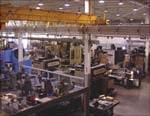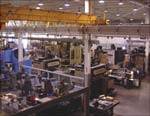Minco Tool and Mold, Inc.: On The Fast Track
Lean manufacturing and automation combined with highly trained and dedicated employees put Minco on the map—and nabbed them the 2005 Leadtime Leader Award: Large Shop
Minco Tool and Mold, Inc. (Dayton, OH) has come a long way since it first opened its doors as a small custom moldmaker 50 years ago. Today, 115 employees in a 45,000 square foot shop contributed to $15 million in sales last year—serving the automotive, medical, sporting goods, office equipment, consumer products and electrical industries with primarily thermoplastic injection molds. A heavy emphasis on lean manufacturing driven by the company's proprietary product data management (PDM) system—along with highly trained and dedicated employees—has put this moldmaker on the map as a force to be reckoned with.
Minco prides itself on having a blend of old-world craftsmanship and modern technology to meet its customers' needs. Boasting leadtimes of four to eight weeks—depending on the complexity and size of the mold—Minco Tool combines an aggressive attitude with automation and 24-hour operation. Operations include product and mold design, mold build, mold repair and maintenance, validation and production—including assembly at Minco's manufacturing facility All Service Plastic Molding (ASPM), which the company started in the mid '80s.
According to President Joe Minneman, while the molding facility "enhances the timely completion of a mold build program" it does not exist to compete with Minco's customers that are also custom injection molders. "Having this capability on site, in real time, we can determine what works and what doesn't work—from a manufacturer's perspective," he notes. Gary Deaton, manager of marketing and manufacturing, adds, "This ability distinguishes us from firms that are just moldmakers with sampling capabilities only. We understand how critical proper venting, balance of fill, et cetera, are to the overall performance of the mold. These items—while a small percentage of the total mold build activity—make a huge difference in the success or failure of the project.
The Early Days
In 1954, Robert (Bob) Minneman began his business as a custom moldmaker after serving an apprenticeship himself and working in several custom mold building facilities before starting his own business. For the next 20 years growth was steady, but Robert recognized that to truly make Minco successful he would have to dedicate some of his focus to training the personnel he required to support the company's growth plan. He worked with the local high schools to find talent he could grow for the industry. It was in the 1960s that Minco developed the extensive, state-approved apprenticeship program that is still strong today.
According to Deaton, who has been with the company for more than 35 years, "We try to emulate the core values—customer commitment, employee enrichment, value, excellence and integrity—he instilled in the company every day." Unfortunately, Bob passed away in early 2004—but long before that he imparted his knowledge and wisdom to his wife Patricia, son Joe (see In His Own Words Sidebar) and daughters Amanda and Margi—who serve as office managers, hold board positions and are part owners of the company.
In the early '80s, the company decided the time was right to add CAD/CAM capabilities. "It allowed us to be faster, better, work in closer tolerances, and be able to replicate the same job downstream if need be, and in 1984 we started 24-hour operation," Deaton explains. "This created more opportunity for revenue with the investment we have in our equipment. It also offers our customers better leadtimes and gives us the ability to eliminate backlogs/jams in certain processes."
A Company Evolves
The '90s saw the development of an early supplier involvement program. "Clearly, during the product design stage is where not only the cost—but also quality and time-to-market—can be most influenced in completing a plastic product application," Minneman says. "The vehicle to take advantage of this opportunity is by involving the major parties of the supply chain: the OEM, designer, moldmaker, molder and resin supplier. By having this knowledge base surrounding the activity and working together in the early stages of development, we have seen phenomenal results and success. Most suppliers welcome this opportunity to participate without any compensation beyond simply the business opportunity creating a 'win/win' situation for everyone—including the consumer."
Employment levels increased, and Minco made a number of facility improvements. In 1995, gas assist tooling and molding technology were added to the company's capabilities. In the latter part of the decade, its website was designed—propelling them into the 21st century. ISO and QS certification were achieved in 1999, which Minneman says was a "tremendous benefit" to the shop for eliminating waste and documenting our processes.
Today, continuous equipment upgrades also are ingredients in Minco's recipe for success. "We constantly upgrade our equipment and roll over our CAD terminals in engineering every 12 to 18 months," Deaton comments. "With all the number crunching, all the complex surfaces we deal with, it's an absolute must." The last three years the ownership has invested approximately $3 million in equipment—quite an impressive number in a down economy—on high-speed machining equipment, graphite electrode cutting machines and computers. They recently purchased a new five-axis milling machine that just went operational earlier this month.
Lean Strategies
Lean manufacturing also played a role in Minco Tool's success in the late '90s, Deaton notes. "We have not proceeded down the path as prudently as others, with specific lean manufacturing processes, but we are constantly looking for waste within our corporation. Specifically, when we went to ISO in 1999 it exposed a lot of non-value added procedures, processes and paperwork that were in place and we continually challenge all of our activity to see what value it adds to our customers, and are they willing to pay for it."
|
In His Own Words "I started at the company back in high school in 1983," Minco Tool President Joe Minneman recalls. "I was involved in our apprenticeship program, and my dad took me under his wing. He directed me to work in every department within the organization. My first job at the shop was facility management, which is a nice way of saying janitor. I worked four hours after school three days a week. I was helper on nightshift then held various shop positions on dayshift. I also was a programmer, designer, QC worker, and worked in our molding operation. I never actually answered to him in the days of my training, but to every manager in those departments. I slowly worked up through sales and accounting for both facilities, then into the vice president position, and finally the presidency a year ago. He thought in order to understand what each employee does and goes through, I should do their jobs. I have worked for every core manager that is still here at one time or another. The passing of my father in June has left quite a void, but the knowledge, business principles and values he instilled in the organization will be the backbone of our future successes." Streamlined Software The CompIS software program—developed over several years to meet Minco's specific needs—is the central place all Minco employees go for all of the information needed to complete a tool build. Minco has developed a central database that stores all of its critical project information. All engineering, manufacturing and scheduling information can be accessed from one interface. Information is pulled from the CAD model and component information is pulled from the UG model and stored in the CompIS database. Individual modules are used to allow each department to access the information needed. Tool prints, part prints, work orders, delivery and sampling schedules are displayed on each desktop and customized to the need of each user. As employees work on a specific detail, they log their hours into the database. All of this information feeds into Minco's accounting software—which allows the company to generate very detailed management reports on an overall and per job basis, including the labor cost of each portion of the job. |
The backbone of the company's lean manufacturing efforts is Compis (Computer Information System)—an internally developed Product Data Management (PDM) system. "This system streamlines our process from a communications aspect," Minneman comments. (See Streamlined Software Sidebar). "It is what drives every process and every department—including accounting and manufacturing—in both facilities. As a result, we are as close to a paperless environment as you can possibly get and still build a mold."
Another effective strategy has been the combination of Minco's sales team for tooling and customer service personnel into what they refer to as project managers. "Each one has the responsibility to find new business, penetrate current customers, and also handle the internal activity from the beginning to the end," says Deaton. "Therefore, the customer has one primary person that is accountable for the project."
Automation Emphasis
Automation is heavily relied upon to meet strict leadtimes. "Moldmaking is very labor intensive, and to compete globally we must do it through technology, automation and unattended machining time," Deaton emphasizes, "eliminating the labor dollar. In many cases, we have two operators handling activity on seven ram EDMs. One individual will run two wire EDMs as well as a whole puncher—all very effectively. Our CompIS software has allowed use to automate our B.O.M, burn sheets and numerous other processes by automatically extracting the data directly from our design files."
Focus on Training
Minneman and Deaton believe Minco's dedication to training is the backbone of the organization. "Many of our executives and others have been with the company for numerous years—serving in positions such as apprentices, moldmakers and mold designers—growing into their specific positions of today," Deaton notes. "We have always looked within for growth opportunities for our employees. A good example of this is the associates in our Project Management Department—all of whom have held various positions in our organization in the past, and because of that, bring a well-rounded understanding of the mold building process."
In conjunction with its apprenticeship program, Minco uses the local community college, Sinclair Community College (Dayton, OH), to provide the off-site training required for the apprenticeship program. In fact, Minco personnel taught some of the original classes in moldmaking and mold design at Sinclair.
Conquering Challenges
By facing global challenges head-on, Minco has ensured its long-term success. "Our attitude is that we cannot sit idly and let the government protect us," Minneman emphasizes. Deaton adds, "Historically, protectionism has failed. The best example recently is the tariff put on steel. While it may have solved an issue for one industry, it created problems for other industries. Essentially there has to be a fair trade, but it also cannot be one sided. We believe that in true capitalism: competition creates better products, better cost and better timing of which everyone benefits."
"As we continue forward there is not an attribute of our business that we cannot continue to grow or make improvements on—whether it is our facilities, personnel education, processes, departments, equip-ment, et cetera," Minneman points out. "We have to continue to give it 110 percent every day in all facets of our business and continue to strive to be customer-friendly and flexible."
Related Content
MMT Chats: Championing Moldmaking Recruitment
Production manager is doing his part to help transform skilled trades recruitment through strategic advocacy and digital engagement.
Read MoreHands-on Workshop Teaches Mold Maintenance Process
Intensive workshop teaches the process of mold maintenance to help put an end to the firefighting culture of many toolrooms.
Read MoreHow to Improve Your Current Efficiency Rate
An alternative approach to taking on more EDM-intensive work when technology and personnel investment is not an option.
Read MoreTackling a Mold Designer Shortage
Survey findings reveal a shortage of skilled mold designers and engineers in the moldmaking community, calling for intervention through educational programs and exploration of training alternatives while seeking input from those who have addressed the issue successfully.
Read MoreRead Next
Ameritech Die & Mold: Life in the Fast Lane
With a heavy emphasis on complex, 3-D parts—primarily in the automotive industry—this moldmaker comes in first place when it comes to unwavering commitment to its employees.
Read MoreYour Guide to Smarter, Faster Mold Design
Dive into expert-curated content delivering proven solutions for mold optimization, manufacturability and precision performance.
Read MoreOvercoming Pain Points in Moldmaking with AI
Shops that embrace AI as a tool, not a threat, can enhance efficiency, preserve expertise, and attract tech-savvy talent.
Read More





















